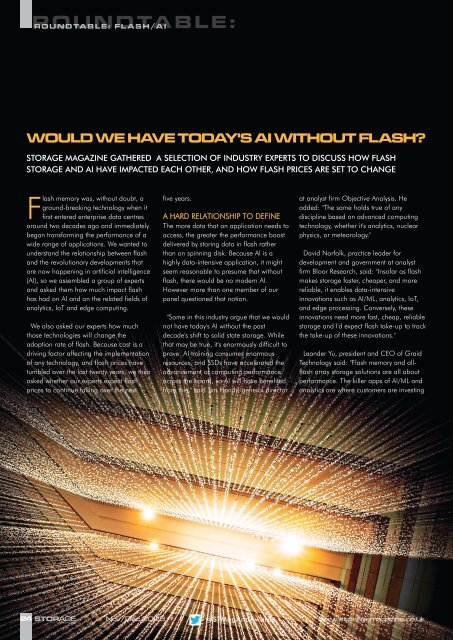ST Nov-Dec 2023
You also want an ePaper? Increase the reach of your titles
YUMPU automatically turns print PDFs into web optimized ePapers that Google loves.
Roundtable 24.qxd 01-<strong>Dec</strong>-23 11:01 AM Page 2<br />
ROUNDTABLE: FLASH/AI<br />
WOULD WE HAVE TODAY'S AI WITHOUT FLASH?<br />
<strong>ST</strong>ORAGE MAGAZINE GATHERED A SELECTION OF INDU<strong>ST</strong>RY EXPERTS TO DISCUSS HOW FLASH<br />
<strong>ST</strong>ORAGE AND AI HAVE IMPACTED EACH OTHER, AND HOW FLASH PRICES ARE SET TO CHANGE<br />
af<br />
Flash memory was, without doubt, a<br />
ground-breaking technology when it<br />
first entered enterprise data centres<br />
around two decades ago and immediately<br />
began transforming the performance of a<br />
wide range of applications. We wanted to<br />
understand the relationship between flash<br />
and the revolutionary developments that<br />
are now happening in artificial intelligence<br />
(AI), so we assembled a group of experts<br />
and asked them how much impact flash<br />
has had on AI and on the related fields of<br />
analytics, IoT and edge computing.<br />
We also asked our experts how much<br />
those technologies will change the<br />
adoption rate of flash. Because cost is a<br />
driving factor affecting the implementation<br />
of any technology, and flash prices have<br />
tumbled over the last twenty years, we then<br />
asked whether our experts expect flash<br />
prices to continue falling over the next<br />
five years.<br />
A HARD RELATIONSHIP TO DEFINE<br />
The more data that an application needs to<br />
access, the greater the performance boost<br />
delivered by storing data in flash rather<br />
than on spinning disk. Because AI is a<br />
highly data-intensive application, it might<br />
seem reasonable to presume that without<br />
flash, there would be no modern AI.<br />
However more than one member of our<br />
panel questioned that notion.<br />
"Some in this industry argue that we would<br />
not have today's AI without the past<br />
decade's shift to solid state storage. While<br />
that may be true, it's enormously difficult to<br />
prove. AI training consumes enormous<br />
resources, and SSDs have accelerated the<br />
advancement of computing performance<br />
across the board, so AI will have benefited<br />
from this," said Jim Handy, general director<br />
at analyst firm Objective Analysis. He<br />
added: "The same holds true of any<br />
discipline based on advanced computing<br />
technology, whether it's analytics, nuclear<br />
physics, or meteorology."<br />
David Norfolk, practice leader for<br />
development and government at analyst<br />
firm Bloor Research, said: "Insofar as flash<br />
makes storage faster, cheaper, and more<br />
reliable, it enables data-intensive<br />
innovations such as AI/ML, analytics, IoT,<br />
and edge processing. Conversely, these<br />
innovations need more fast, cheap, reliable<br />
storage and I'd expect flash take-up to track<br />
the take-up of these innovations."<br />
Leander Yu, president and CEO of Graid<br />
Technology said: "Flash memory and allflash<br />
array storage solutions are all about<br />
performance. The killer apps of AI/ML and<br />
analytics are where customers are investing<br />
24 <strong>ST</strong>ORAGE <strong>Nov</strong>/<strong>Dec</strong> <strong>2023</strong><br />
@<strong>ST</strong>MagAndAwards<br />
www.storagemagazine.co.uk<br />
MAGAZINE

















